Most of us try to steer clear from felony offenses – because, well, they’re felonies.
But in Nevada, every person charged with a felony is entitled to certain rights and protections enshrined in the law.
It pays to know your rights and understand the legal landscape you may face.
That’s why we’ve put together a comprehensive guide to navigating felony charges in Nevada.
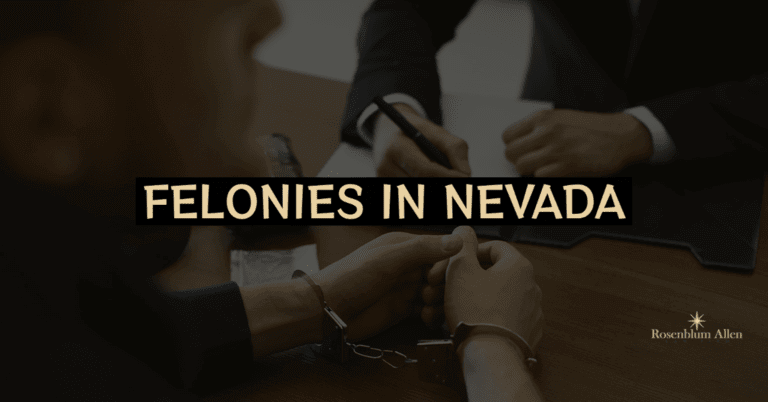
With this guide, you can get ready for court by understanding the most commonly asked questions that generally arise in these cases.
From what’s necessary to prove guilt to who pays restitution after a conviction, we give you all the information you need to weather a Nevada felony case.
So don’t stress – prepare!
Read on and get an essential education on Nevada felonies today.
What is a felony charge in Nevada?
In Nevada, a felony is an incredibly serious crime. It has harsh punishments like long prison time and hefty fines – nothing to take lightly!
What are the different classes of felony charges in Nevada?
In Nevada, there are five levels of felony crimes. The most serious is Category A, and the least severe is E. No matter the category, every felony offense is a big deal.
What is the potential sentence for a felony conviction in Nevada?
Committing a felony in Nevada can have some serious consequences; from probation and fees to spending the rest of your life behind bars, or even worse. It all depends on what you did and how bad it was.
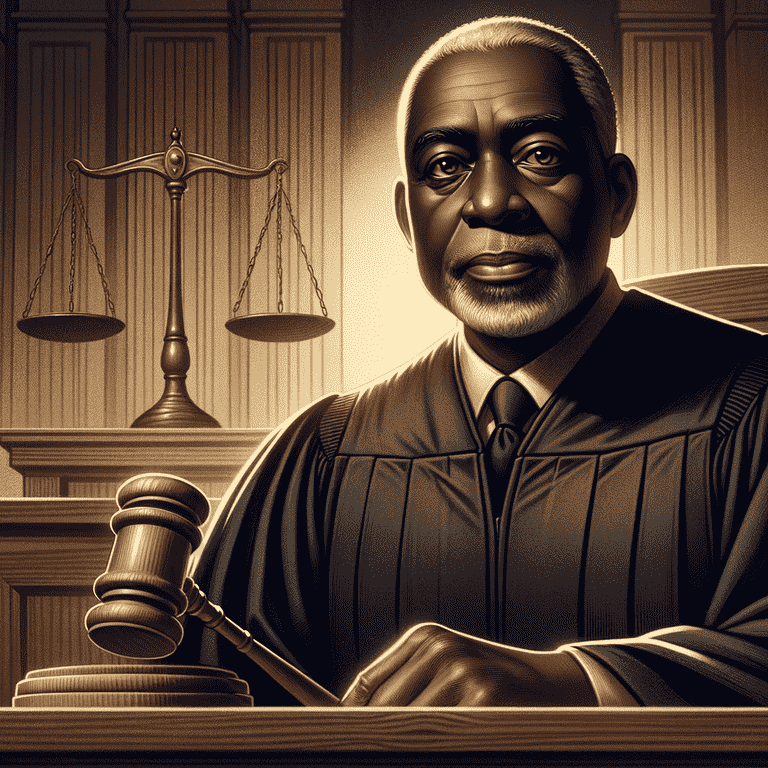
What is the process for arraignment on felony charges in Nevada?
In Nevada, if you’ve been charged with a felony, you’ll need to go before a judge. You’ll tell them whether you’re guilty or not, then the judge will figure out how much money you need to pay for bail.
Do I need a lawyer for a felony charge in Nevada?
For felony charges in Nevada, it’s essential to have a lawyer—the penalties can be harsh and understanding the legal system can be tricky. So, get a Las Vegas criminal defense attorney to help you out!
How do I find a good criminal defense attorney in Nevada?
If you’re looking for a great criminal defense lawyer in Nevada, start by asking around and checking out online reviews. Then, make sure to check with the local bar associations for their recommendations. Finally, don’t forget to book consultations with any attorneys that fit the bill to make sure they’re the best fit for your case.
What are the steps of the criminal trial process in Nevada?
In Nevada, if someone has done something wrong, there’s a process to figure out what happens next. The journey might start with being arrested and then heading to a court hearing. The person could try to work out an agreement with the other side or go to trial. Finally, they will either be given a punishment or allowed to appeal.

What is the standard of proof for a felony conviction in Nevada?
The standard of proof for a felony conviction in Nevada is “beyond a reasonable doubt.”
Can I plea bargain to avoid a felony conviction in Nevada?
Pleading guilty in criminal cases can be a smart move, especially for felony charges. It’s an alternative to a trial and you might even get a reduced charge or sentence when you bargain.
What is the difference between a plea deal and a plea agreement in Nevada?
In Nevada, a “plea deal” and “plea agreement” mean the same thing. It’s a deal where someone who is accused of something agrees to plead guilty or not contest important matters in exchange for certain rewards.
What is the role of a prosecutor in a felony case in Nevada?
In Nevada, prosecutors are the ones in charge of bringing someone to justice for a serious crime. It’s their job to collect the facts and fight for the court to find the defendant guilty. They make sure that justice is served.

What is the role of a defense attorney in a felony case in Nevada?
In Nevada, a defense attorney is on a mission to defend their client. They get to know the defendant and fight for their rights, while crafting strategies to help them beat the charges. It’s all about protecting their client in the face of serious accusations!
Can I be released on bail while waiting for trial on a felony charge in Nevada?
If you’ve been accused of a felony in Nevada, you may be able to get out on bail while you wait for your trial. But the decision and amount are up to the judge. They’ll look at all sorts of things, like the crime you’re accused of, your record, and if there’s any chance you’ll run away or do something dangerous.
What factors does the court consider in setting bail for a felony charge in Nevada?
When deciding how much bail a person accused of a felony should have to pay in Nevada, the court looks at a few things. These include the seriousness of the crime. The court will consider if the defendant has done something bad before. A judge will also want to know how much the defendant cares about their community. Finally, the court will look to see if there’s a chance the Defendant will try to run away, and if they could be dangerous.
What happens at a preliminary hearing for a felony charge in Nevada?
At a preliminary hearing for a felony charge in Nevada, a judge decides whether there is enough evidence to have a trial. The prosecutor presents some evidence, and the defense lawyer can question witnesses.

Can I be charged with more than one felony at once in Nevada?
Yes, it is possible to be charged with more than one felony at once in Nevada.
Can I face federal charges for a felony committed in Nevada?
Yes, if the felony violates federal law or occurs on federal property, you can face federal charges for a felony committed in Nevada.
What happens if I violate my bail conditions in Nevada?
If you don’t follow the rules that come with your bail in Nevada, the court might take away your bail and put you in jail.
Can my bail be increased if I violate my conditions of release in Nevada?
If you don’t stick to the rules in Nevada, the court can make your bail cost more or even take it away completely. So be sure to stay on track!
What is the process for a grand jury indictment in a felony case in Nevada?
In Nevada, a grand jury can indict someone for a felony if they think that person has done something wrong. This document is like a notice saying that person must stand trial.

What is the role of a grand jury in a felony case in Nevada?
In Nevada, grand juries play a key role in deciding if someone might have done something wrong enough to be charged with a felony. They’ll look at all the evidence and decide if it looks like a crime was committed.
Can a felony charge be dismissed in Nevada?
In Nevada, a felony charge may be dismissed with the right evidence. It all depends on the situation. So if you find yourself in this situation, make sure to present your case!
What is the process for a plea agreement in a felony case in Nevada?
In Nevada, when facing a felony charge, you can work out an agreement with the prosecutor. Then, a judge needs to sign off on it before it’s official. To do this, you have to give up your right to a trial and agree to the terms of the deal.
Can I plead guilty to a lesser charge in a felony case in Nevada?
In Nevada, you can plead guilty to something less serious than a felony in exchange for a lighter punishment. It’s known as a plea bargain – you take a deal, and the prosecutor agrees to give you some advantages. This is a great way to get a lesser sentence.

What is the process for a bench trial in a felony case in Nevada?
In Nevada, felony cases can be tried without a jury. A judge will hear all the evidence and then decide if the accused person is innocent or guilty. The prosecutor and defense can tell their sides at the start, show evidence and question each other’s witnesses. After everything has been heard, the lawyers say their last words and the judge has the final say on the verdict.
Can I be sentenced to probation for a felony conviction in Nevada?
Yes, it is possible to be sentenced to probation for a felony conviction in Nevada. However, the availability of probation depends on various factors such as the nature of the offense and the defendant’s criminal history.
What is the process for sentencing in a felony case in Nevada?
In Nevada, when someone has been convicted of a felony, there’s a process to decide what punishment they should get. The judge looks at things like how bad the crime was and the person’s past before picking what fits best – like jail time, money, or supervision. The defendant and their lawyer can give reasons for why the sentence should be different, and after the judge makes their decision, the defendant has the chance to try to change it.
Can a felony sentence be appealed in Nevada?
In Nevada, you can challenge a felony sentence. You have 30 days after the sentence to tell the court you’re appealing. Then, your lawyer will need to write down why they believe there was an error during the trial or sentencing. If the court agrees with your lawyer and thinks something went wrong, then it may change the sentence. But, if everything is okay, then the sentence stays as it is.

What is the difference between probation and parole in Nevada?
After you’re convicted of a crime in Nevada, the court or parole board might supervise you either on probation or parole. Probation is when the judge supervises you in the community instead of jail at the time of sentencing. It’s like a second chance to show you can follow the rules and stay out of trouble. Parole, meanwhile, is when the Board of Parole Commissioners supervises you after you serve some of your prison sentence. They help you smoothly transition back into the community while still making sure you don’t break any laws.
How long can I be sentenced to prison for a felony conviction in Nevada?
In Nevada, the punishment for a felony depends on how bad it was. A Category A felony could mean life in jail, while a Category E felony may only lead to 1-4 years of probation or even no jail time at all! It’s up to the judge to decide each sentence based on the situation.
Can I be sentenced to life without parole for a felony conviction in Nevada?
In Nevada, there are cases where someone can be put in jail forever or even get the death penalty for a really bad crime. This only happens for certain types of crimes like murder with special details.

What is the Nevada Three Strikes Law?
Nevada has a “Three Strikes” law that’s like a warning for repeat criminals. If you break the law three times, you can get locked up forever. But even with just two strikes, things get harder—you could end up with more time in jail. This law is meant to keep people safe from bad guys who don’t learn their lesson.
Can I face deportation for a felony conviction in Nevada?
It’s possible for non-citizens to be deported for committing a felony in Nevada. The exact crime depends on its seriousness, how long the person has lived in the US, and their immigration status. If you’re worried about being deported due to a crime, it’s important to talk to an immigration lawyer.
Can I lose my right to vote for a felony conviction in Nevada?
People in Nevada who have been convicted of a felony do not get to vote while they are in prison, on parole, or probation. Once their sentence is finished and they are free, their voting rights come back automatically, but they need to sign up again to cast a ballot.

Can I lose my right to own firearms for a felony conviction in Nevada?
If you’re convicted of a felony in Nevada, you won’t be able to buy or own a gun. This applies across the US, since it’s against federal law for felons to have guns. Reinstatement of firearm rights is only possible through a pardon, expungement, or other legal action. Plus, it could lead to criminal charges if you’re caught with a gun after being convicted of a felony.
Can I lose my professional license for a felony conviction in Nevada?
If you have a felony charge in Nevada, your professional license might be taken away. Depending on the conviction and kind of job, it can be suspended, revoked, or even disqualified forever. It’s a good idea to talk with a knowledgeable lawyer if this is happening to you.
Can I be denied employment or housing for a felony conviction in Nevada?
If you have a felony in Nevada, you may get turned down for a job or house. Some employers and landlords may not be willing to give you a chance even if you worked hard to change your ways. That’s why there are laws to protect folks in these situations. Some people might consider individual circumstances, too, so don’t lose hope. It’s best to talk to an attorney if you need help getting back on your feet.

Can I apply to have my record sealed for a felony conviction in Nevada?
It is possible to have a felony conviction record sealed in Nevada, but it’s not available for all felonies. Certain offenses can be eligible and the court considers lots of things like what the crime was and if you are trying to stay good before deciding if it’ll be sealed. If it is sealed then other people won’t be able to see it, but some agencies or certain employers still can. It can be hard to figure out if you’re allowed so it’s best to talk with a lawyer.
How long do I have to wait to apply to have my record sealed for a felony conviction in Nevada?
If you’ve been convicted of a felony in Nevada, the amount of time you have to wait for your record to be sealed depends on the crime. Normally, non-violent felonies require five years before you can apply for sealing. Violent offenses and those with serious harm inflicted on a victim need to wait ten years. But, there are some cases which may never be sealed or take longer than 10 years. For more information, it’s best to talk to an effective lawyer.
What is the process for applying for expungement of a felony conviction in Nevada?
Nevada gives people a second chance by allowing them to seal away certain criminal records. Depending on the offense and how much time has passed since then, you can petition the court to keep your records private. You just need to tell the court about your specific crimes and sentences, as well as why your request should be granted. After this, it’s up to the judge to decide if you get your wish for a fresh start.
Can I apply for a pardon for a felony conviction in Nevada?
If you’ve been convicted of a felony in Nevada, you can try to get it pardoned. But it’s not easy! The people who decide if you deserve it will have to look into your case and talk about it in public. To be eligible, you’ll need to meet certain rules and fill out an application.
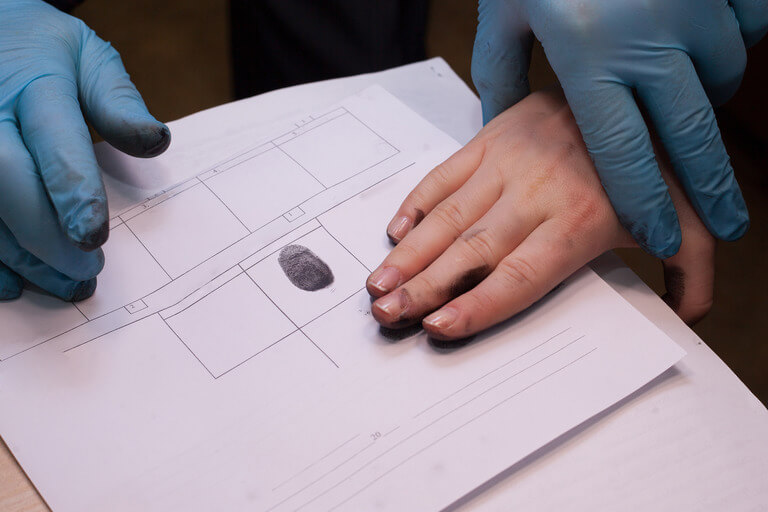
What is the process for applying for a pardon in Nevada?
If you want to be pardoned in Nevada, you have to submit a form to the Board of Pardons Commissioners. You’ll need to tell them about the offense you committed, give any evidence, and write something about why you’ve changed. Then the Board will talk it over and suggest whether the Governor should forgive you.
Can a felony charge be reduced to a misdemeanor in Nevada?
Yes, it is possible for a felony charge to be reduced to a misdemeanor in Nevada, but it usually requires the agreement of the prosecutor and the judge.
What is the process for reducing a felony charge to a misdemeanor in Nevada?
In Nevada, if you want to turn a felony charge into a misdemeanor, you need to file paperwork with the court and explain why. Maybe you have something that makes your situation better or maybe you finished a program that helps people change their ways. But even if you do that, the prosecutor could still say no.
Can I challenge the constitutionality of a law used to charge me with a felony in Nevada?
Yes, you can challenge the constitutionality of a law used to charge you with a felony in Nevada.
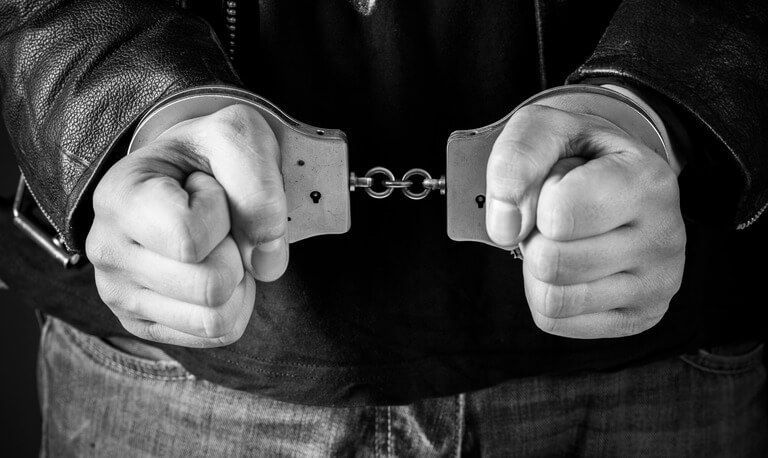
Can I challenge the admissibility of evidence in a felony case in Nevada?
In Nevada, someone accused of a felony can fight to keep certain evidence out of the courtroom. The judge decides if the evidence can be used by looking at things like how important and believable it is, and whether it’s fair or not.
Can I request a change of venue in a felony case in Nevada?
In Nevada, if a person in a felony case thinks they won’t get a fair trial due to all the publicity, they can ask for the court to move it somewhere else. They have to write down their request and turn it in. The court will consider the motion and decide if the trial should be moved if it can’t be fair in the original place.
Can I request a different judge in a felony case in Nevada?
In Nevada, if somebody is accused of a serious crime, they can ask the court to replace the judge. This is called filing a motion for disqualification. The accused must have a strong reason to do this, such as evidence the judge isn’t being fair or impartial.
Can I request a jury?
Yes, in Nevada, you have the right to request a jury trial for a felony case.
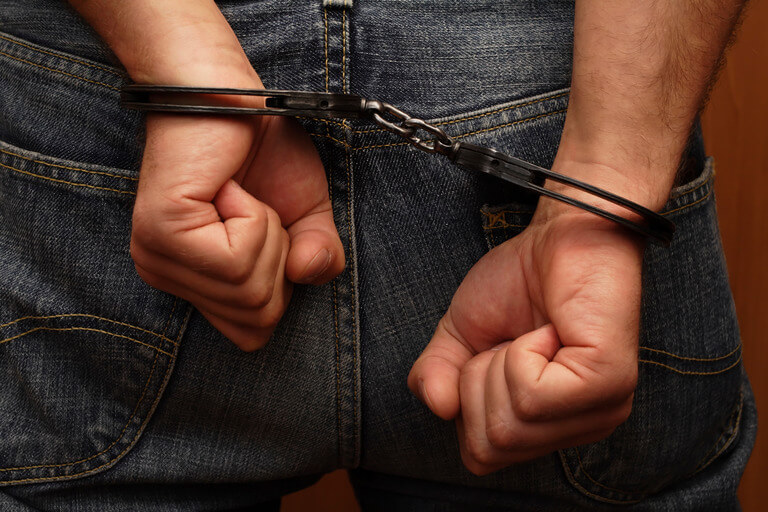
How can I find resources or support during my legal process?
If you’re going through a legal process, know you’re not alone. You have loads of support systems at your fingertips, like legal aid clinics, victim/witness assistance programs, support groups and online forums. Plus, you can get help from private attorneys or reach out to advocacy groups for extra resources. No matter what you need, there’s someone waiting to lend a helping hand.

Conclusion
Navigating Nevada felonies can be an intimidating and complex undertaking.
With this guide, we’ve provided practical answers to some of the most pressing questions. We’ve given you advice on how to best approach various scenarios.
The aim? To arm you with the knowledge and clarity needed to make informed decisions and build a strong foundation for your defense. A
As you embark upon this journey, remember that when it comes to your legal rights, knowledge is power. The key to success is up to you.

Frequently Asked Questions
What is a felony charge in Nevada?
A felony charge in Nevada is a severe criminal offense resulting in harsh punishments like long prison sentences, hefty fines, and restitution payments. Felonies are more stringent than misdemeanors and typically require a minimum of 1 year in state prison if convicted.
What are the different classes of felony charges in Nevada?
Nevada categorizes felonies into five classes from A (most serious) to E (least severe):
- Category A felonies – Murder, kidnapping, sexual assault, trafficking a controlled substance
- Category B felonies – Battery with a deadly weapon, robbery, burglary, grand larceny, auto
- Category C felonies – Assault with a deadly weapon, embezzlement, possession of a controlled substance
- Category D felonies – DUI 3rd offense, domestic battery 1st offense, theft
- Category E felonies – DUI 2nd offense, domestic battery 2nd offense, possession of a controlled substance
What is the potential sentence for a felony conviction in Nevada?
Sentences vary widely depending on the felony class:
- Category A: Life in prison or death penalty
- Category B: 1-10 years in prison and up to $10,000 fine
- Category C: 1-5 years in prison and up to $10,000 fine
- Category D: 1-4 years in prison and up to $5,000 fine
- Category E: No less than one year and no more than four years in prison and up to $5,000 fine
Other factors like criminal history can increase sentences. Probation may be available for some lower-class felonies.
What is the process for arraignment on felony charges in Nevada?
The arraignment is the first court appearance after being charged. You are informed of the charges against you, enter a plea (guilty, not guilty, no contest), and the judge decides on bail. Often, a defense attorney will request more time to review evidence and enter a plea at a later date.
Do I need a lawyer for a felony charge in Nevada?
Yes, having an experienced criminal defense attorney is highly recommended when facing a felony charge in Nevada. The penalties are severe, and the law is complex. An attorney can negotiate with prosecutors, argue to get charges reduced or dismissed, and defend your rights at every stage.
How do I find an excellent criminal defense attorney in Nevada?
Tips for finding a good criminal defense lawyer in Nevada:
- Search state bar association directories specifically for criminal defense attorneys
- Read reviews and ask people for recommendations
- Check credentials like years of experience and track record with similar felony cases
- Interview lawyers and make sure you feel comfortable with their expertise and approach
- Ask about legal fees to find one within your budget
What are the steps in the felony trial process in Nevada?
The main steps in a felony trial in Nevada are:
- Arraignment – Charges are read, plea entered
- Pretrial motions – The defense can challenge evidence, request venue changes, etc.
- Pretrial conference – Judge and attorneys discuss procedural matters
- Jury selection – The jury pool is screened through voir dire questioning
- Opening statements – Prosecution and defense outline their cases
- Testimony and evidence – Witnesses testify, and evidence is presented
- Closing arguments – Attorneys summarize their sides
- Jury deliberations – Jury discusses the case and attempts to reach a verdict
- Verdict – Jury acquits or convicts the defendant
- Sentencing – If convicted, the judge determines and imposes a sentence
What is the standard of proof for a felony conviction in Nevada?
For a felony conviction in Nevada, the prosecution must prove guilt “beyond a reasonable doubt.” This is the highest standard of proof in the law and much stricter than the “preponderance of evidence” used in civil cases. Reasonable doubt means jurors must be near certain of guilt based on the evidence.
Can I plea bargain to avoid a felony conviction in Nevada?
Yes, plea bargaining is widespread in Nevada felony cases. In a plea deal, the defendant pleads guilty, usually to a lesser charge, in exchange for a more lenient sentence. This avoids the time and risks of a trial. Prosecutors may agree if they have a weak case or want to secure a conviction. An experienced criminal defense lawyer can negotiate the best deal.
What is the difference between a plea deal and a plea agreement in Nevada?
A plea deal and plea agreement mean the same thing under Nevada law. It is an agreement where the defendant pleads guilty and accepts a conviction, usually for a lesser charge, in exchange for a lower sentence or dropped charges. The prosecutor and judge must approve the negotiated plea agreement.
What is the role of a prosecutor in a felony case in Nevada?
The prosecutor represents the state and has these prominent roles in a Nevada felony case:Determine which charges to file based on evidence
- Present evidence and examine witnesses proving the defendant’s guilt
- Make a sentencing recommendation to the judge after conviction
- Negotiate potential plea deals with the defense before trial
Overall, they advocate for the harshest punishment allowed by law for the defendant.
What is the role of a defense attorney in a felony case in Nevada?
The defense attorney’s role includes:
- Investigating the circumstances and evidence thoroughly
- Identifying weaknesses in the prosecution’s case
- Drafting and arguing pretrial motions to exclude evidence or dismiss charges
- Negotiating plea deals for lesser sentences when beneficial
- Selecting a jury favoring the defense
- Cross-examining prosecution witnesses
- Presenting favorable witnesses and evidence for the defense
- Delivering a closing argument highlighting reasonable doubt of guilt
- Arguing for the minimum sentence if convicted
Their duty is to represent the defendant’s best interests at all stages.
Can I get released on bail for a felony in Nevada?
Most defendants are eligible for bail release while awaiting trial for a Nevada felony. The judge will consider factors like:
- Severity of charges and potential sentence
- Prior criminal history and record of appearing in court
- Financial resources to post bail
- Safety of the community and risk of witness intimidation
Bail may be denied for severe crimes like murder. Conditions like electronic monitoring can be imposed, and bail can be revoked for violations.
What factors determine the bail amount in Nevada felonies?
Factors Nevada judges consider when setting bail amounts include:
- Nature and circumstances of the alleged crime
- Prior felonies and bail violations
- Defendant’s financial resources
- Defendant’s family ties and employment in the community
- Public safety concerns and risk of failing to appear
More serious crimes result in higher bail, while ties to the community may lower it. Many hire bail bond services to post the entire bail amount.
What happens at a preliminary hearing for a felony in Nevada?
At the preliminary hearing, the prosecution must present enough evidence to establish probable cause that the defendant committed the felony to proceed to trial. The judge will hear testimony from investigators and witnesses, and the defense can cross-examine them. If probable cause is found, the judge orders a trial. Otherwise, charges are dismissed.
Can I be charged with multiple felonies simultaneously in Nevada?
Yes, you can face multiple felony charges arising from the same incident if your alleged actions meet the elements of several offenses under Nevada law. For example, an armed robbery could result in separate charges for theft, assault with a deadly weapon, possession of a stolen vehicle, and conspiracy.
Can I face federal charges for a felony in Nevada?
If your alleged criminal conduct violates Nevada state and federal law, you can face prosecution in both state and federal court. For example, crimes committed on federal land or against a federal officer can trigger federal felony charges. Drug offenses also frequently warrant federal charges.
What happens if I violate felony bail conditions in Nevada?
Violating terms of your pretrial release, like failing drug tests, missing court dates, or contacting victims, will get your bail revoked in Nevada. Once revoked, you will be arrested and held without bail until trial. Prosecutors may also file a new criminal charge for bail violation.
Can my bail be increased for violating release conditions in Nevada?
Judges can raise your initial bail amount if you violate release conditions like a curfew, travel restrictions, or no contact orders. The degree of bail increases depends on factors like the frequency and severity of violations and whether they endangered others.
What is the grand jury indictment process for Nevada felonies?
A grand jury can indict on felony charges before arrest. Prosecutors present evidence and witnesses in secret sessions. The jury decides if probable cause exists to charge the defendant formally. If they return an indictment, an arrest warrant is issued. The defense has no role in grand jury proceedings.
What is the role of a grand jury in Nevada felony cases?
Grand juries play these critical roles in Nevada felony cases:
- Review criminal allegations and evidence in private proceedings
- Determine if enough probable cause exists to indict and proceed with charges
- Safeguard against unfounded prosecutions by requiring the presentation of evidence
- Compel witness testimony and document production via subpoena powers
- Issue an indictment that formally charges the defendant

Glossary
Felony: A serious criminal offense that can result in long prison sentences, large fines, and other harsh punishments. More severe than misdemeanors.
Category A felony: The most serious felony offense category in Nevada, including murder, kidnapping, and sexual assault.
Category E felony: The least serious felony offense category in Nevada, including second DUI offenses and domestic battery.
Arraignment: The first court hearing after being charged where the defendant is informed of charges, enters a plea, and bail is determined.
Plea bargain: Negotiating to plead guilty to a lesser charge in exchange for a more lenient sentence. Avoids trial.
Prosecutor: The lawyer representing the state who advocates for the harshest punishment allowed by law.
Defense attorney: The lawyer representing the defendant who identifies weaknesses in the prosecution’s case and negotiates the most favorable outcome.
Bail: Money deposited to the court to secure the temporary release of a defendant awaiting trial.
Preliminary hearing: A hearing where the prosecution must present enough evidence to establish probable cause for the felony to proceed to trial.
Grand jury: A group that reviews evidence in private proceedings to determine if probable cause exists to indict and formally charge the defendant.
Indictment: A written statement charging the defendant with a crime, issued by a grand jury after finding probable cause.
Probable cause: Reasonable grounds to believe a crime was committed by the defendant, based on facts and evidence. Needed to arrest, indict, and prosecute.
Proof beyond a reasonable doubt: The highest standard of proof in the law, which the prosecution must meet to convict in a criminal felony case.

More Resources for You
Molly Rosenblum, Esq., our lead attorney, has diligently developed a comprehensive range of resources to assist those facing criminal charges. Through the Rosenblum Law website, individuals can access a wealth of information and guidance tailored to various aspects of criminal defense. These resources, created to support and educate in times of need, cover a broad spectrum of legal issues, providing insights into specific charges and offering expertise on navigating the legal system. Here’s a brief overview of the resources available:
Criminal Defense Attorneys: A thorough resource offering insights and defense strategies for a wide range of criminal charges. Explore the resource.
Las Vegas DUI Lawyer: Specialized guidance for those facing DUI charges, including legal strategies and the potential implications of a DUI. Learn more.
Domestic Violence Lawyer Las Vegas: Expert advice and legal representation for individuals accused of domestic violence, detailing defense options and legal rights. Discover the details.
Drug Possession Lawyer: Information on defending against drug possession charges, including nuances of Nevada law and defense strategies. Begin understanding your defense.
Sex Crimes Attorney: Dedicated resources for those accused of sex crimes, offering guidance on the complex legal challenges and potential defenses. Start exploring your options.
CPS Defense Attorney: Assistance for individuals involved in child abuse and neglect allegations, including CPS procedures and defense strategies. Understand your rights.
Misdemeanor Lawyer: Expertise on handling misdemeanor charges, detailing the potential impacts and how to effectively navigate these charges. Learn about misdemeanor defense.
Juvenile Defense Lawyers: Specialized legal support for juveniles facing criminal charges, focusing on the unique aspects of juvenile law. Discover juvenile defense strategies.
Las Vegas Warrant Defense Attorney: Guidance for individuals with outstanding warrants, outlining steps to address and resolve warrants. Explore warrant defense.
Las Vegas Probation Violation Attorney: Information on probation violations and how to address accusations of violating probation terms. Understand probation violations.
Theft Crime Defense Lawyer: Defense strategies and legal advice for those accused of theft, including petty theft to grand larceny. Learn about theft defense.
Kidnapping Lawyers: Expert legal representation and advice for kidnapping charges, detailing defense approaches and legal challenges. Explore kidnapping defense.
Firearms Lawyer Las Vegas: Guidance on charges related to firearms, including illegal possession and use, and strategies for defense. Understand firearms law.
Molly Rosenblum, Esq., through these resources, aims to provide individuals facing criminal charges with the knowledge and tools necessary for a robust defense. We encourage those in need to leverage these resources, ensuring informed decisions and effective legal representation in their defense.

Offsite Resources You May Find Helpful
LegalMatch: An online platform that helps individuals find and connect with experienced criminal defense attorneys in Nevada.
Nevada Department of Corrections: Provides information about the state’s correctional system, including inmate search and resources for families of incarcerated individuals.
American Civil Liberties Union (ACLU) of Nevada: Advocates for civil rights and liberties, including legal defense and resources for individuals facing criminal charges in Nevada.
Nevada Justice Association: A professional organization of attorneys dedicated to protecting the rights of individuals and promoting access to justice in Nevada.
Nevada Office of the Attorney General: Provides information about the role of the Attorney General in Nevada’s criminal justice system and resources for crime victims.
Why You Haven't Already Hired a Defense Attorney to Help You
Watch this short video to take the next big step toward defending your rights against your felony charge.

A Special Message from Our Lead Attorney

Molly Rosenblum, Esq
Dear Reader,
Thank you for taking the time to explore these resources. They have provided valuable insights and a better understanding of the legal landscape.
If you or someone you know needs legal assistance, please don’t hesitate to reach out. The team at The Rosenblum Allen Law Firm and I are committed to providing legal advice and strong representation for our clients.
I invite you to schedule a free consultation to discuss your unique situation. We’re here to help guide you through the legal process and fight for your rights.
Please call us at (702) 433-2889 to schedule your free consultation.
I look forward to the possibility of working with you.
Sincerely,
Molly Rosenblum, Esq.


